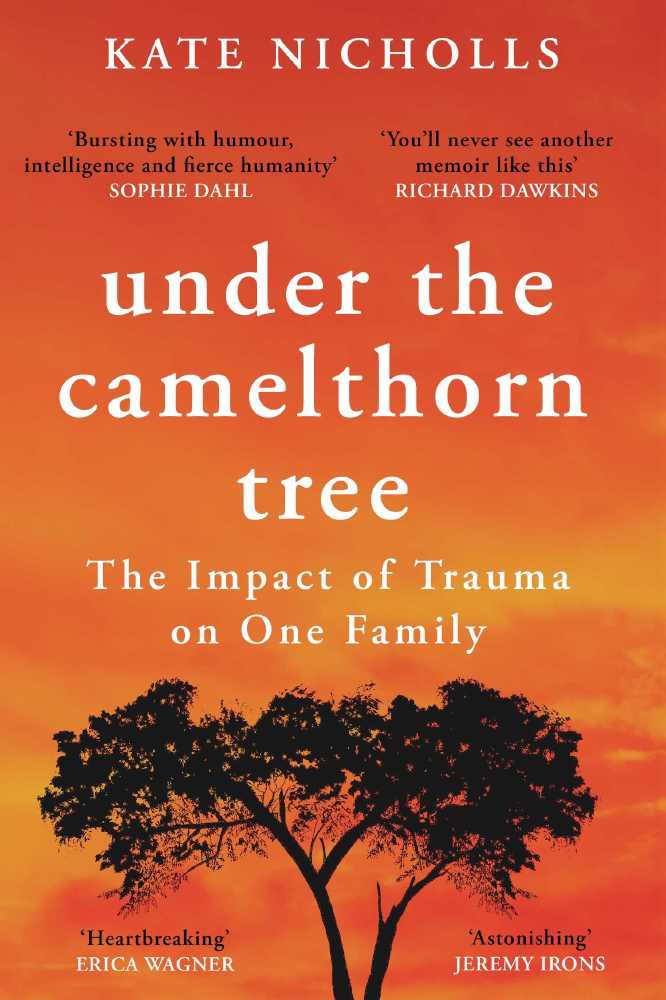When I was gang-raped, my loving children were worn down by my pain. They became the secondary victims. They were eight, fourteen, sixteen, seventeen and twenty- three when it happened, and we were living in Botswana doing lion research in the Okavango Delta. No matter where home is living with someone who has Post-traumatic Stress Disorder is bewildering, challenging, potentially dangerous and can do long -term harm.

Under the Camelthorn Tree
We must look at the impact of sexual violence from all perspectives because it's the family who deals with the midnight terrors, the rages, the erratic behaviour, the violence, and the desolation: all the while loving the person who is bewildering them. Families need help.
I remember the morning after the attack. Determined to prove I was not broken I made pancakes for breakfast: a pile of them. The sounds of family felt echoey and far off: I couldn't smell my children. Deep shock. I was alive, bruised, purple fingerprints on my throat, no bones broken. Could have been much worse. Get on with it. Mothers are good at that. In 1996 I worked for an NGO in Botswana, Women Against Rape and I had seen raped mothers' getting on with it' going about their daily tasks: collecting water, cooking, going to work, raising their children: shut down, silent, angry. Raped mothers in refugee camps, in warzones, and perhaps living on your road have no option but to carry on. Unravelled by brutality.
My unravelling happened over time. Like ice cracking deep inside me, I fragmented. The physiological impact of profound fear changed my internal landscape. I became a stranger to myself. Disassociated from my people, I began drinking. My anger raged untamed. I wasn't going to be beaten by three men. I was omnipotent. I was deluded. My loyal children watched me unravelling. They were afraid and unprotected.
When a rape is reported, it is imperative we consider the needs of the victim, and their family. We need to acknowledge rape doesn't just happen to one person. The model is there– we don't have to reinvent the wheel. AA and NA have programmes for families and partners, and gaining a deeper understanding is helpful for all parties. We need to be open and honest about human frailty and pain. That's scary in a Snapchat /Insta perfect world.
Rape is a crime long shrouded in shame and secrecy: currently, women and men are speaking out, and the shroud is being lifted: I celebrate that. Yet, for raped mothers, there is an additional and painful layer of shame that needs to be lifted and examined. No woman wants to be a bad mother. No-one wants to hurt their children. But I did hurt my children. The people I love most in the world lost the mother they had relied on and trusted. They learned to fear me. Simply put rape broke me, and my behaviour finally snapped the umbilical bonds of trust.
I'm not ashamed that I was raped, but I am desolate that while I was healing, I hurt my children. Healing is selfish and isolating. It is a messy, Sisyphean process. It cannot be fitted to a curve: it's not a neatly balanced equation. Healing is chaotic, muddled, ugly, visionary, enriching, disempowering, bleak, and painful. It happens in quantum time frames, each isolated from the others. Good days followed by bad days. My unpredictability was a desolation for my children. I broke their hearts.
It is a testament to how massive their hearts are that I am well today, and our family is once again powerfully bonded by love and trust: the former was never lost and the latter look time to regain. It's no fun sharing the fact I hurt the people I love most in the world. But honesty is powerful. More powerful than the men who pinned me down in the sand.
Eventually, I stopped drinking, my empathy returned, my grit re-emerged, and my happiness settled back into my core. The worst part of getting better was confronting the harm I had done. Sadly, my children are not the only children to have suffered collateral damage due to sexual crime.
That's why I'm speaking out.

